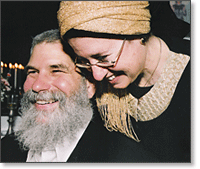An excerpt from Seeds and Sparks by Rabbi Avraham Arieh Trugman
The Hagadah of
Pesach and all the rituals and mitzvot of the night are ordered
according to fifteen steps. These fifteen stages in which the Seder unfolds are also referred to as
“signs.” Our Sages tell us that signs and symbols have great significance (Kritot 6a). For example, we begin the
year on Rosh HaShanah night by eating all sorts of foods, each one symbolic of
certain blessings we hope for at the beginning of a new year. The steps of the
Seder likewise have great
significance and symbolize the process of personal, national and world
redemption. There is a custom of calling out the name of each step or “sign” at the Seder as if announcing a lost object which needs to be reclaimed
and redeemed (See The Chassidic Haggadah by Rabbi Eliyahu Touger).
The fifteen steps of the Seder also relate to the fifteen physical steps in the Holy Temple,
on which the Levites stood while singing praises to God. King David wrote
fifteen “songs of ascent” to parallel the fifteen steps of the Levites in the Temple. The
correspondence of the fifteen steps of the Seder
and the fifteen steps of the Temple gives us the feeling of rising from one
level to the next during the Seder,
as if being carried on the wings of song to ever greater heavenly heights.
Fifteen is the numerical value of the Hebrew letters yod
and heh, the first two letters of
the four~letter name of God, and a name of God in their own right. This name
significantly appears in the book of Exodus in the story of Amalek, the arch enemy of the Jews, when
God figuratively puts His hand on His throne and promises war with Amalek in every generation (Exodus
17:16). Rashi points out that only the first two letters of the name of God are
written and the word for throne is also written missing a letter. This, Rashi
explains, indicates that until Amalek,
the embodiment of evil, is wiped out, God’s name and throne are, as it were,
incomplete.
The recital
during the Seder of Pesach of the
words: “ In every generation they rise up against us to destroy us…” reflects
the same archetypal reality as expressed in the story of Amalek. The primordial energy of good versus evil, as expressed
first in the story of Adam, Eve and the snake, and their final confrontation in
the prophesies of the “end of days,” is very relevant to the energy surrounding
Pesach and our present situation in
Israel.
There are “signs”
all around us as Israel
and the world confront the terrorist threat so prevalent today. But, as in
every sign or dream, much goes after how we choose to interpret it. We are most
certainly being challenged and are being spoken to by God through the events
around us.
As much as we
need to react to evil and deal with the perpetrators, a more fundamental
spiritual accounting is called for. We are told that the month long search and
cleaning process for chametz,
unleavened products, preceding Pesach must be accompanied by the
realization that physical chametz is
but a reflection of the inner spiritual work we need to do to truly prepare for
Pesach. Each person, community and all of Israel needs to
look deeply within to see what we can do to rectify the present situation.
There is certainly a need for a renewal of commitment to personal spiritual
growth. To increase Torah learning and observance, to integrate sound Jewish
morals and ethics, to increase our love of our fellow Jews and humanity, to give greater
support to the land of Israel, and to recommit ourselves to Jewish collective
responsibility. Let no one be oblivious to the fact that if Israel is
seriously weakened (God forbid), every Jew in the world will be affected in a
very negative way.
The Ba’al Shem
Tov taught that every Jew contains a spark of the Messiah deep within his soul and that the ultimate arrival of the
Messiah depends on each and every person activating his greatest
spiritual potential, thus creating a critical mass of redemptive energy. This
then will be transformed into the figure we call the Messiah.
In Egypt, when the
slavery became so unbearable, we cried out in unison from the weight of our
burdens and God heard and acted. Once again, we as a people need to feel the
suffering and danger surrounding us and shake off our numbness and complacency
in order to cry out to God to deliver us. There is no more auspicious time for
us all to do this than on Pesach. We as a people have suffered enough - We Want
Redemption Now!!



